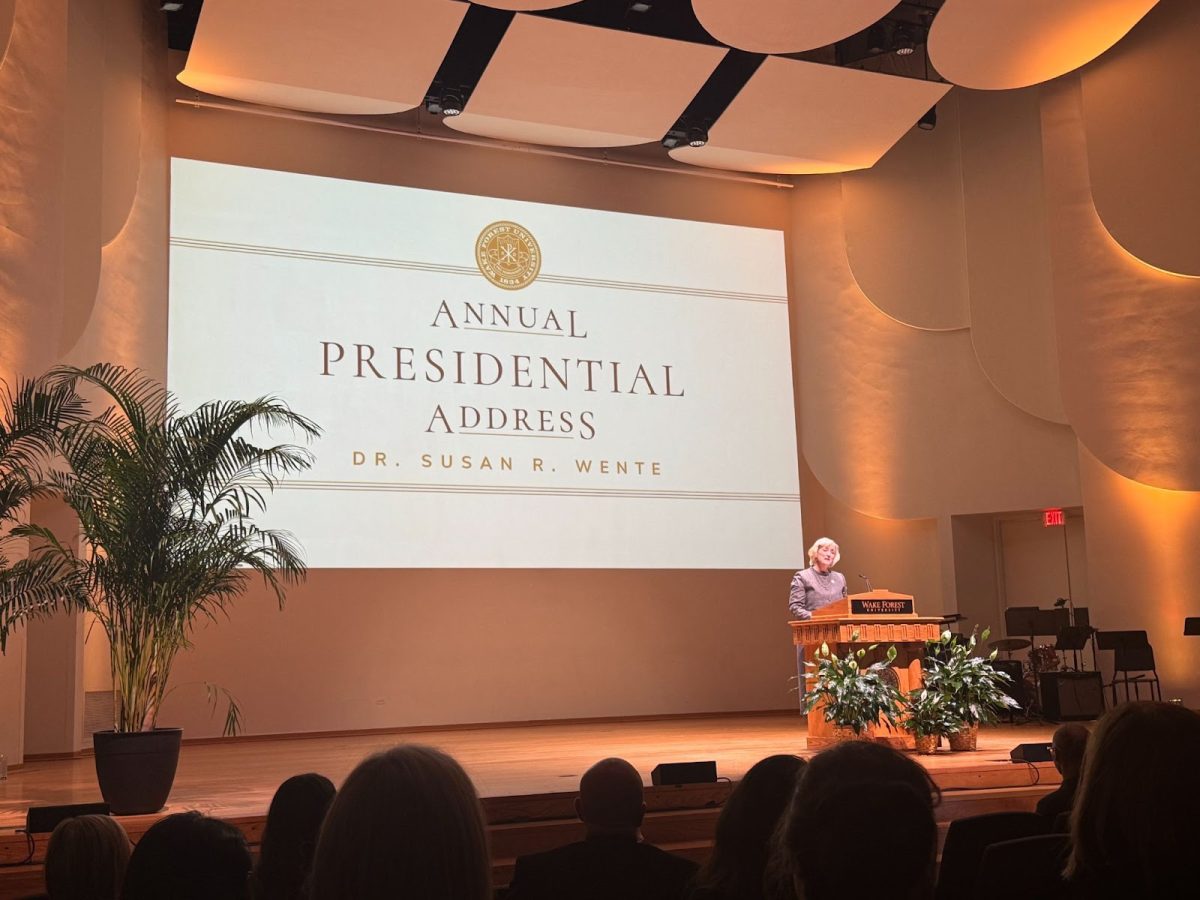With artificial intelligence (AI) transforming industries faster than ever, Wake Forest is taking deliberate steps to integrate AI into its curriculum while emphasizing ethical considerations and responsible use.
Sponsored by the Office of Information Systems, the “AI for Good” conference took place on Nov. 9 at the student activity center, gathering students, faculty and industry experts to discuss the current and future impact of AI. The event aimed to inspire thoughtful engagement with AI and explore its potential for positive societal change.
Embracing the challenges and opportunities of AI, the Wake Forest School of Business is preparing their students for a rapidly evolving job market and helping lead a larger conversation around how AI can be beneficial to the Wake Forest community.
School of Business initiatives
The School of Business recognized challenges in integrating AI into the classroom, including the rapid evolution of the field and ensuring its responsible use. Shannon McKeen, professor of the practice and executive director of the Center for Analytics Impact at the School of Business, said that by focusing on teaching students to continuously learn and adapt, the school hopes to prepare graduates for the complex realities of AI in the workplace. He also said this is beneficial to address broader concerns, including AI’s environmental impact and long-term societal risks.
“It’s incumbent on the business school to stay current with business trends,” McKeen said, “and our stakeholders — both students and employers — are looking for AI fluency. While what constitutes ‘AI fluency’ is still debated, it’s crucial for graduates to understand both AI’s potential and its ethical implications.”
McKeen said one challenge of incorporating AI is finding a balance between using it as a tool to learn and using it in place of authentic thought.
“People should use AI to stretch their capabilities, not just reduce their effort,” McKeen said. “There’s a temptation to use it as a shortcut, particularly in demanding programs. Instead, AI should complement human abilities and help produce better outcomes.”
Despite this concern, leaders in the business school see significant opportunities to enhance both faculty productivity and student outcomes through AI. John Montana, executive director of online strategy and instructional technology innovation at the School of Business, emphasized the need for proactive engagement with new technologies.
“This is like anything in the world that is changing, right?” Montana said. “I think you have to commit some time to learning, reading and playing with it to really be able to form a position and be able to address some of the challenges and concerns.”
“[Pedagogical approaches] could free up faculty time for what Wake is all about—our teacher-scholar model,” McKeen said. “We see opportunities to better customize learning experiences and meet students where they are in their learning journey.”
A broader conversation around AI
This initiative is part of a larger university-wide conversation around AI’s role in society.
The event was organized by Alantis Green, a junior majoring in computer science. Green emphasized how vital it is for students to understand such a prominent aspect of technology.
“We think it’s important,” Green said, “especially [for students] going into industries, since AI is the biggest trend currently.”
Paige Lord, founder of Just AI Media Network and product marketing manager for AI at Github, opened with a keynote on the rapid evolution of AI technology.
“This AI moment is not settled,” Lord said. “Everything around AI can be influenced and shaped right now, and that’s a really unique moment in history to exist in that you can be a part of shaping how this technology works for humanity.”
Students attending the conference asked thoughtful questions about AI’s role and longevity.
“Is AI going to be here to stay or is it just part of the waves?” asked Ugo Okoli, a senior double majoring in computer science and communications.
The “AI for Good” conference underscored the urgency of engaging with AI’s ethical and societal implications. As Lord noted, the technology is expected to become an estimated $305 billion industry by the end of this year with the potential to reshape countless facets of society.
“We can work to ensure that the technology…has an impact beyond [industry profits],” Lord said. “We’re all empowered to do that.”















